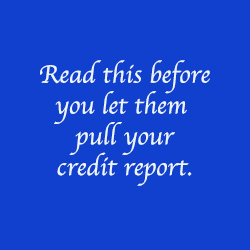 It’s time for you to get the credit you deserve. After all, your credit really does matter. It could open the door to unbelievable deals like a 60-month interest-free loan on a brand new car. On the flip side, the door could be slammed shut when you’re denied a mortgage, car loan, or place to live.
It’s time for you to get the credit you deserve. After all, your credit really does matter. It could open the door to unbelievable deals like a 60-month interest-free loan on a brand new car. On the flip side, the door could be slammed shut when you’re denied a mortgage, car loan, or place to live.
Whether you like it or not, your three-digit credit score makes a big difference. In fact, lenders use it to make decisions about you. It’s gives them an objective way to determine if you’ll pay a loan back.
The higher your score, the less risk. With a high credit score you’ll get easier approvals and pay less (lower interest rates) for financial products.
Does your credit matter if you’re not applying for loans? Yes, because some employers use it to make hiring decisions. And many insurance companies use your credit to set premium rates (how much you pay).
How to Check Your Credit Report
Your credit report shows you who you owe, what you owe and how you pay (on-time, late).
If you haven’t checked your credit report in 2013, do it now. It’s quick and easy. You can pull your credit report for FREE in less than 5 minutes without any strings attached.
Why is my credit report free? By law you’re entitled to get a free copy of your credit report from each credit reporting company (Equifax, Experian, TransUnion) every 12 months. Get a free copy of your credit report on AnnualCreditReport.com today!
Still not convinced you need to check it? Watch my video below and I’ll give you five big reasons to check your credit report. I’ll also show you what to look for on it.
One more thing – if you find any incorrect information or fraudulent activity on your credit report, take action immediately to have it resolved. Click here to find out how.
What about My Credit Score?
The credit reporting companies (Equifax, Experian, TransUnion) calculate your credit score using a special formula. It’s largely based on your credit history.
However, each credit reporting company uses its own input data and calculation formula to determine your credit score. That’s why you’ll probably have different credit scores for each credit reporting company.
The most popular scoring method is your FICO score. The FICO score ranges from 300 – 850.
What’s a good credit score? Unfortunately, there’s no clear definition of what number represents a good credit score. Some consider a good credit score to be 700 or higher. And credit scores ranging in the 620 -699 range to be average. So aim for 730+.
According to a recent article I read the average credit score is about 675.
How to Get Your Credit Score
Unlike your credit report, you normally have to pay for your credit score. Credit reporting companies typically charge you around $15. And it could cost you $45 to obtain your credit score from all three credit reporting companies. Visit the credit companies websites to get your credit score: Equifax, Experian, TransUnion.
Beware of companies offering you a free credit score. They often have a catch! For example, you may have to enroll in credit monitoring services to get that so-called free credit score. If you forget to cancel your enrollment, you could end up paying every month for that ‘free credit score’.
The cheapest way to get your credit score is to ask for it when the lender pulls your credit report. It’s worked for me.
How to Raise Your Credit Score Up, Up, Up
Bad credit? Don’t worry, you can change it.
In fact, I was doing the happy dance just the other day when one of my clients text me. She is buying a new home, so the lender pulled her credit. And guess what? She is in the 800 Club. All of her hard work has paid off! Her credit score has shot up to the 800s.
A few tips to help you improve your credit score:
- Pay Your Bills On Time. Your payment history is the biggest factor in calculating your FICO score.
- Pay off Debt. Are you carrying a balance on your credit card? It’s best to pay it off every month. But if you can’t try to limit your outstanding balance to 40% or less. For example, say you have a $1,000 credit limit then you’d keep it $400 or less.
- Minimize Opening New Accounts. Just say no to any unneeded credit. Yeah, I know they offered you an additional 20% off if you apply. But you’re only buying $30 worth of stuff, so it’s only saving you $6. And opening a new account could negatively impact your credit score.
Sound Off! What tips do you have to improve your credit? Do you have any credit nightmares to share? I’d love to hear from you!


